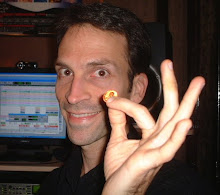Musicians complain constantly about being taken advantage of. Let's face it, most of us feel somewhat insecure about the strength of our negotiating position with employers, so we fail to drive a hard bargain, or perhaps fail to even negotiate at all. I'm no exception. Talking money is one of my least favorite parts of the job. It often seems as though the service that we provide is deemed frivolous or expendable. The bartenders, caterers, and waitresses all have to work, but the musicians get to play.....we probably shouldn't get paid at all!
The reality, however, is that competent professional musicians possess rare and highly developed skills which are essential to the success of the establishments that employ us. No disrespect intended to any other professions, but customers don't come to nightclubs to see the bouncers, they don't enroll in a music school because of its bookkeeper, they don't buy CDs because of the packaging, and they don't come to concerts to check out the engineer doing the monitor mix. It's the music that drives the business, and that's our department. Employers know this, and they are usually more willing to reward good talent than you might think.
There is no need to resort to cutthroat competition in order to be fairly compensated. Just bear in mind some basic principles and you should do fine. Remember that building a large network of good relationships will always be the key to your survival in music, so try to stand firm for your best interests while maintaining a sympathetic and cooperative tone. Here are a few key points to apply when negotiating:
1. Don't undercut yourself. Sometimes when I have a used piece of gear to sell, I catch myself setting a price based on what I imagine the buyer will consider a good price, instead of starting from a price that I wish to receive. It's like I'm negotiating against myself before the actual bargaining has even begun! Start higher than you think you can get and give yourself a chance to win a better deal. You'll be giving yourself room to compromise if necessary, and you might be pleasantly surprised at what the buyer is actually willing to pay.
2. Decide on your starting price and your minimum price in advance. If you get called upon to quote a price for a gig before you have thought everything through (travel and preparation time, equipment issues, etc.), you might feel uncertain about your bottom line, and that is a vulnerable negotiating position to be in. In such cases, I usually try to postpone the negotiation until I've had time to think out my position, or if pressed, I will simply quote a high price. I also have a rule of thumb that my time is generally worth $X per hour (a generous but not outrageous rate), so if someone proposes an unusual job that I haven't done before, I can simply quote them that rate and know that it will be worth my while if they accept.
3. Make small concessions. Let's say you're booking your band for a wedding gig. The client initially offers you $800 and you tell him that you normally charge $2000. These are your respective starting prices, and they don't mean much. You're both going to have to make concessions in order to reach a deal, but it's the next step that will determine the likely victor in this negotiation. If his counter offer is $850 and you respond with an offer of $1500, then two things have happened. First, he has signaled by his small concession ($50) that he intends to hold pretty firm to his price, and second, you have signaled by your large concession ($500) that you are willing to come down a lot more. The momentum of this negotiation is now definitely in the client's favor. Don't get in the habit of immediately saying "oh let's just split the difference". Start by making a small concession. Chances are the other party will follow with a large concession.
Next week, I'll share some more thoughts on the subject of negotiation.
Subscribe to:
Post Comments (Atom)






2 comments:
Valuable advice for any self-employed person, not just musicians. A buddy of mine said that your initial quote for any service should "make the client look like they've been slapped in the face." Shooting for the moon has worked well for me many times, sometimes I get the inflated price I quoted, sometimes I negotiate down to what I was expecting anyway and leave the client feeling like they got a great deal.
I select the price of a gig I want to play. I learned by having a good business voice helps. It projects serious business not play. Once you give the price if the offer is not accepted then give them a price as a discount. The word discount lets the person know this is not my normal price. If he or she does not accept the price I can tell if this is a game. I will say thank you and leave. I have gotten good at figuring out if a price is too little for all the good entertainment someone is getting. At one time I was so scare to walk, because I felt I had to get any price they would give me to play. www.cdbaby.com/paulabenson
Post a Comment